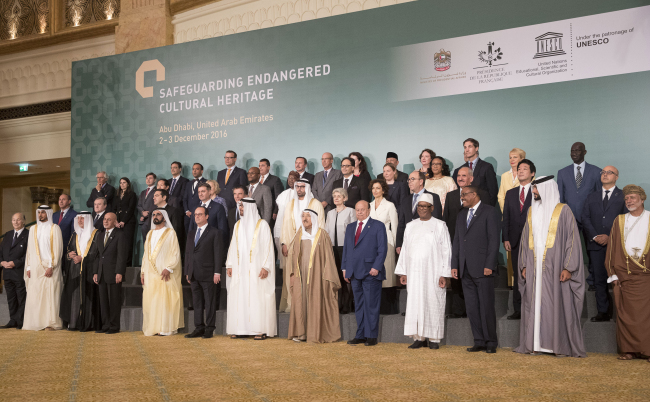ABU DHABI, United Arab Emirates (AFP) - Representatives from dozens of countries gathered in Abu Dhabi on Friday to focus on setting up a $100 million fund to protect and restore heritage sites threatened by extremism and conflict.
The two-day conference reflects growing international alarm over the destruction of ancient artifacts by Islamic State group jihadists using sledgehammers, bulldozers and explosives.
Another key aim is to establish “refuge zones” around the globe for endangered works of art, according to organizers.
There were calls Friday by its Emirati, French and UN initiators for joint action to safeguard endangered cultural treasures.
“To succeed, we need to work together ... united for heritage,” UNESCO Director Irina Bokova told participants.
Protecting heritage “is inseparable from protecting human life,” she said, describing its deliberate destruction as a “war crime.”
On the eve of the meeting, five Nobel Prize winners appealed for urgent action to safeguard world heritage sites, pointing to irreparable damage in Iraq, Syria, Afghanistan and Mali.
“Part of our history has been lost forever, with the goal of fanaticism being to undermine our hope for the future,” said a statement from Aung San Suu Kyi, Kofi Annan, Ellen Johnson Sirleaf, Orhan Pamuk and Mario Vargas Llosa.
UNESCO says 55 out of 1,052 global heritage sites are listed as “World Heritage in Danger.”
They include the Crac des Chevaliers castle and the ruins of Palmyra in Syria, the archaeological remains of the Bamiyan Valley in Afghanistan, the Old City of Sanaa in Yemen and Timbuktu in Mali.
The conference aims to create “a broad coalition of partners connecting the dots between the security, humanitarian and cultural issues with so many organizations and governments” taking part, said Bokova.
Delegates from around 40 countries, including more than a dozen heads of state or government, among them several Gulf monarchs, are attending the gathering, based on an initiative led by France and the United Arab Emirates.
French President Francois Hollande and Abu Dhabi Crown Prince Sheikh Mohammed bin Zayed al-Nahyan, whose countries will be key contributors to the fund, will make closing speeches Saturday.
Former French culture minister Jack Lang, head of the Paris-based Arab World Institute, said the forum “will launch concrete action” such as the creation of a fund to help cover the cost of transporting, safeguarding and restoring affected monuments.
 |
On Saturday, French President Francois Hollande (bottom left), poses for a photo between Sheikh Mohammed bin Zayed al-Nahyan, crown prince of Abu Dhabi and UAE’s deputy commander-in-chief of the armed forces, on his right, and Sheikh Mohammed bin Rashid al-Maktoum, UAE prime minister and ruler of Dubai, with the other head of states and dignitaries during the Safeguarding Endangered Cultural Heritage Conference at Emirates Palace in Abu Dhabi, United Arab Emirates. (AP-Yonhap) |
France will contribute $30 million to the fund, Lang has said.
It will be formed as an “independent legal entity,” according to a preparatory document that says it will probably be established in Geneva from 2017.
The conference opened as Swiss authorities announced they had seized cultural relics looted from Palmyra, Libya and Yemen, that were being stored in Geneva‘s free ports.
They were deposited at the free ports in 2009 and 2010, before the outbreak of the Arab Spring revolts, Geneva prosecutors said.
The other key aim of the Abu Dhabi conference is to establish the refuge zones.
The proposed partnership would include governments, public institutions, private groups, nongovernmental organizations and experts.
“UNESCO will play a critical role to guide and to advise and to monitor where exactly the needs are the most,” Bokova told AFP, adding that the conference was a “good start.”
A French official described the initiative as the “cultural counterpart” of the international military and political war on terrorism.
Hollande, who has called for “asylum rights for artifacts,” last month announced that a safekeeping facility is to open in northern France in 2019.
In addition to housing the Louvre Museum’s stored collection, it could also be a refuge for endangered artworks.
France is expected to make the proposal during the Abu Dhabi conference.
The Louvre Abu Dhabi, whose delayed opening is now expected in 2017, “could also become a refuge zone” for threatened artifacts, a French official said.
Louvre Museum Director Jean-Luc Martinez warned during a panel discussion that extremists are exploiting media as a propaganda tool for their “deliberate destruction of heritage”.
Hollande will visit the Louvre Abu Dhabi on Saturday as well as a military air base near the Emirati capital from which French warplanes have been flying missions targeting jihadists in Iraq and Syria.








